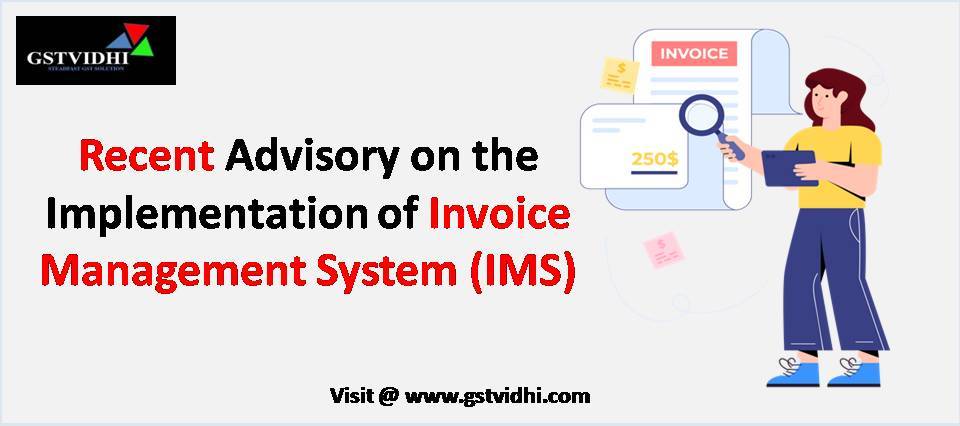
Advisory on the Implementation of
Invoice Management System (IMS)
Introduction: The
Invoice Management System (IMS), introduced on the GST Portal in October 2024,
is a new facility aimed at enhancing compliance and transparency in managing
invoices. Through IMS, recipients can accept, reject, or keep pending invoices
reported by suppliers in their GSTR-1/1A/IFF. The system ensures that
recipients have control over the Input Tax Credit (ITC) reflected in their GSTR-2B
and subsequently in their GSTR-3B. Given the early stages of IMS
implementation, this advisory outlines its key features, challenges, and
guidance for taxpayers.
Key Features of IMS:
1. Recipient
Actions and ITC Determination:
Recipients
can take action on invoices reported by suppliers. Their decisions directly
impact the generation of GSTR-2B and the ITC availability.
·
Accepted
Invoices: ITC will be available in GSTR-2B.
·
Rejected
Invoices: ITC will not reflect in GSTR-2B.
·
Pending
Invoices: No immediate effect until further action is taken.
2. Supplier
View:
The
IMS includes a Supplier View feature, enabling suppliers to monitor recipient
actions on their reported invoices. This transparency helps suppliers rectify
any disputes or errors early.
3. Editing
Actions:
Actions
taken by recipients on IMS (e.g., accept/reject/keep pending) can be edited
until the filing of GSTR-3B for the corresponding tax period.
4. Recompute
GSTR-2B:
After
modifying any actions on IMS, recipients can recompute GSTR-2B to ensure
accurate ITC reflection in GSTR-3B.
Initial Implementation Challenges
Common Issues
Taxpayers
may encounter the following issues during the early phases of IMS:
• Mistaken rejection or acceptance of
invoices.
• Incorrect ITC details auto-populated in
GSTR-2B and GSTR-3B.
• Miscommunication between suppliers and
recipients regarding invoice actions.
System Limitations
Some
invoices are excluded from IMS actions but remain visible under the "No
Action Taken" status in Supplier View:
• Ineligible ITC due to Place of Supply
(POS) rules or Section 16(4) of the CGST Act.
• Reverse Charge Mechanism (RCM) supplies.
Advisory for Taxpayers
1. Ensure
Accurate Actions:
Taxpayers
should verify invoices carefully before taking actions on IMS. This ensures
that ITC in GSTR-2B and liability in GSTR-3B reflect the correct data.
2. Recompute
When Necessary:
In
case of errors, taxpayers can modify their actions on IMS and use the Recompute
GSTR-2B feature to align the ITC details with their records.
3. Edit
GSTR-3B:
If
ITC or tax liability in GSTR-3B is incorrectly auto-populated due to IMS
actions, taxpayers can manually edit these fields before filing.
4. Coordination
with Suppliers:
Suppliers
should regularly use the Supplier View functionality to track recipient actions
and resolve disputes promptly.
Specific Advisory for GSTR-2B
Generation
1. QRMP
Scheme Taxpayers:
Taxpayers
under the Quarterly Return Filing and Monthly Payment (QRMP) scheme will not
receive GSTR-2B for the first two months of a quarter. For example, GSTR-2B for
October and November 2024 will not be generated, while it will be available for
December 2024.
2. Pending
GSTR-3B Returns:
Taxpayers
who have not filed their previous GSTR-3B returns will not receive GSTR-2B for
the subsequent period. Filing pending returns will enable GSTR-2B generation
using the "Compute GSTR-2B" button.
Conclusion: The
introduction of IMS is a pivotal step in the evolution of GST compliance,
providing a structured approach to invoice and ITC management. While challenges
in the initial implementation phase are expected, the system offers ample tools
to rectify errors and ensure accuracy. By adhering to the advisories and
leveraging IMS functionalities like Recompute GSTR-2B and Supplier View,
taxpayers can navigate this transition effectively and ensure seamless
compliance.
Disclaimer: All the Information is based on the notification, circular and order issued by the Govt. authority and judgement delivered by the court or the authority information is strictly for educational purposes and on the basis of our best understanding of laws & not binding on anyone.
Click here